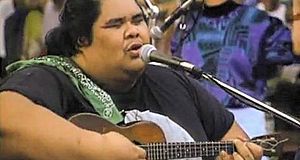Israel Kamakawiwo'ole facts for kids
Quick facts for kids
Israel Kamakawiwoʻole
|
|
|---|---|

Kamakawiwoʻole in 1993
|
|
| Born |
Israel Kaʻanoʻi Kamakawiwoʻole
May 20, 1959 |
| Died | June 26, 1997 (aged 38) Honolulu, Hawaii, U.S.
|
| Other names | Bruddah |
| Occupation |
|
| Years active | 1976–1997 |
| Children | 1 |
| Musical career | |
| Genres | |
| Instruments |
|
| Labels | Mountain Apple Company |
| Associated acts | Mākaha Sons of Niʻihau |
Israel Kaʻanoʻi Kamakawiwoʻole (born May 20, 1959 – died June 26, 1997), also known as Bruddah Iz or just IZ, was a famous Hawaiian musician. He was a talented singer, songwriter, and also an activist for Hawaiian rights.
He became very popular outside of Hawaii when his album Facing Future came out in 1993. His special mix of "Somewhere Over the Rainbow/What a Wonderful World" was on this album. This song later appeared in many movies, TV shows, and commercials, making him known worldwide.
Iz was known for his amazing ukulele playing. He also mixed other music styles like jazz and reggae into his Hawaiian sound. Many people see him as one of the best Hawaiian musicians ever. In 2010, NPR called him "The Voice of Hawai‘i".
Contents
Early Life and Musical Beginnings
Israel Kamakawiwoʻole was born in Honolulu, Hawaii. His parents, Henry and Evangeline, worked at a popular nightclub. His uncle, Moe Keale, was also a musician and a big influence on Iz.
Iz grew up in Kaimuki. He started playing music at age 11 with his older brother Henry ("Skippy") and his cousin Allen. They listened to famous Hawaiian musicians like Peter Moon and Don Ho.
When Iz was a teenager, his family moved to Mākaha. There, he met Louis Kauakahi, Sam Gray, and Jerome Koko. Together with Skippy, they formed the band Makaha Sons of Niʻihau.
The Makaha Sons of Niʻihau
The Makaha Sons of Niʻihau became very popular. They mixed modern and traditional Hawaiian music. The band toured Hawaii and the United States.
They released many successful albums, starting with No Kristo in 1976. Their albums Puana Hou Me Ke Aloha (1984) and Hoʻola (1986) were big hits. Iz wanted to make music that honored traditional Hawaiian sounds.
In 1982, Iz's brother Skippy passed away at age 28. Later that year, Iz married his childhood sweetheart, Marlene. They had a daughter named Ceslie-Ann, also known as "Wehi."
Solo Music Career
In 1990, Iz released his first solo album, Ka ʻAnoʻi. This album won awards for Contemporary Album of the Year and Male Vocalist of the Year.
His album Facing Future came out in 1993. It included his most famous song, the mix of "Somewhere Over the Rainbow/What a Wonderful World". This album also featured other popular songs like "Hawaiʻi '78" and "White Sandy Beach."
Facing Future became Hawaii's first album to sell over a million copies in the United States. It is the best-selling album by a Hawaiian artist ever.
In 1994, Iz was named favorite entertainer of the year. He continued to release successful albums like E Ala E (1995) and N Dis Life (1996). In 1997, he won more awards, including Male Vocalist of the Year and Album of the Year. He watched the awards from his hospital room.
After he passed away, his album Alone in Iz World (2001) became a number one hit on Billboard's World Chart.
Supporting Hawaiian Rights
Israel Kamakawiwoʻole was a strong supporter of Hawaiian rights. He believed in Hawaiian independence. He often sang about these ideas in his songs.
For example, in his song "Hawaiʻi '78," he sang: "The life of this land is the life of the people." He also sang the Hawaiian state motto: "Ua Mau ke Ea o ka ʻĀina i ka Pono." This means "The life of the land is perpetuated in righteousness." This motto shows his message that caring for the land means caring for Hawaiian culture.
Iz used his music to help people understand that native Hawaiians should not be treated as second-class citizens.
Later Life and Passing
Iz struggled with his health throughout his life. He passed away on June 26, 1997, at the age of 38.
On July 10, 1997, the Hawaiian flag flew at half-staff for his funeral. His koa wood casket was placed at the state capitol building. He was only the third person, and the only non-government official, to receive this honor.
About 10,000 people attended his funeral. Thousands more gathered on July 12, 1997, as his ashes were scattered into the Pacific Ocean at Mākua Beach. Many people honored him by honking their car horns across Hawaiian highways. Videos of his funeral and the scattering of his ashes were used in the official music videos for "Over the Rainbow." These videos have been viewed over a billion times online.
Legacy and Recognition
On September 20, 2003, a bronze statue of Iz was unveiled in Waianae, Oʻahu. Hundreds of people came to honor him.
In 2010, NPR called Iz "The Voice of Hawaii." In 2011, he received a German national music award called the Echo.
His music also inspired the 2014 Pixar short film, Lava. The film's creators were inspired by Iz's cover of "Somewhere Over the Rainbow" and his musical style.
On May 20, 2020, Google Doodle celebrated Iz's 61st birthday. They created a special page and a cartoon video with his "Somewhere Over the Rainbow" song. The video showed places in Hawaii that were important to Iz, like Diamond Head and Mākaha Beach.
Images for kids
-
A statue honoring Kamakawiwoʻole on Oahu
See also
 In Spanish: Israel Kamakawiwoʻole para niños
In Spanish: Israel Kamakawiwoʻole para niños


